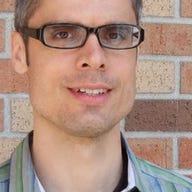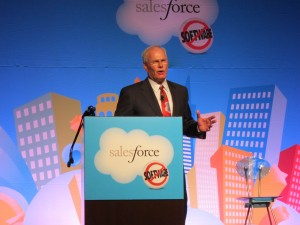Dreamforce: 'Unusual thinkers' needed for healthcare reform

One of the tracks today at Dreamforce in San Francisco had nothing to do with cloud computing, mobile apps, or new developer platforms. It did however, cover an important and controversial topic that impacts everyone, which is healthcare.
The visionaries invited to speak at Unusual Thinkers: The UCSF Track included 7 doctors and researchers who covered sugar, obesity, aging, sports medicine, stress, and more. Among them was Mark R. Laret, CEO of UCSF Medical Center, which includes UCSF Benioff Children's Hospital.

Laret kicked off the opening talk with a brief history of healthcare in the US, noting that we are now at a inflection point like no other in the industry, and it's IT-driven.
In the 60s the big changes were the introductions of Medicare and the Medicaid program. The 70s saw a jump in the private health insurance industry and costs started to head through the roof. "GM puts more into healthcare costs than steel in for their cars", he said. Managed care arrived in the 80s and consumers did not like it, and in the 90s we saw an economic boom, but nothing much happened. Finally, in the first decade of the new millennium, we see the introduction of a diversity of health plans, many with large deductibles and limitations. Now, one out of very six dollars spent by the government goes to healthcare, and a starting nurse at UCSF earns $110K per year.
"We need people outside of the industry to be involved and think through how to bring healthcare to the industry," he said. Information technology has been so successful because it has harbored many interesting people, and those kinds of paradigm shifting thinkers are needed in healthcare. One example is Nobel Prize winner Stanley Prusiner who proved that mad cow disease is caused by a protein, an idea initially rejected by the medical community.
Laret asked, "Is healthcare is supposed to be a public good or a business or what?" Hospitals and doctors are the people you are working with when a child is born, when cancer is diagnosed, and when there is death. So it can't be relegated to an impersonal process.
He went on to list more problems with the current system. For instance, those who live in rural areas do not get enough treatment, while those in urban may actually get too much. Then there's the decades old system of how you go about seeing a doctor. You first need to find a doctor and then make an appointment which is time consuming and uses a lot of energy just to get a brief moment with an intellectual mind.
"We need the Ruby on Rails for healthcare...disruptive innovation. We need innovative thinkers to challenge the status quo, people outside our industry to weigh in, and leverage technology in new ways. Healthcare needs to power of "AND." As in provide more care AND do it cheaper. Highly personalized care AND less labor. And so on."
Laret then raised tough questions and issues in the areas of science, policy and people:
Science
- How do we apply what we already know more broadly to benefit people worldwide?
There's the science of discovery that you often hear about, but how about the science of integration and applications? Over 90,000 people die in hospitals each year in hospitals due to lack of hand washing by providers. Improving hand hygiene alone could go such a long way.
- How do we leverage data in new ways to improve care and lower costs?
One example is Genomic Health, which is focused on the development and commercialization of genomic-based clinical diagnostic tests for cancer.
- How do we accelerate the time from discovery to adoption?
It took 48 years for James Lind's discovery that citrus fruits cured scurvy to be finally implemented by the US Navy. Now the time from general discovery to general adoption in the industry is 17 years. If the grand vision of computing intelligence over the decades comes to be, the time can be reduced to near-real time.
Policy
- We are not entirely sure to what is important to us. Is it providing care? - Currently, we got to get enough insured patients to come through to cover the costs of low income patients. The whole healthcare reform puts more people into Medicare and Medicaid. - Is healthcare a right? Should everyone get everything? - Will have a national debate about what healthcare people should get vs. what they can afford? - If we insure all people, we will think through how we ration healthcare?
People
- Healthcare is incredibly labor intensive industry - One of the challenges is communication, how do we improve it among multiple caregivers, patients, and families? The #1 reason errors happen in hospital is due to communication errors. - UCSF is exploring ways for people to communicate online, like using Chatter. - How do we reconcile increasing demand and dropping capacity? - We have to distinguish the sickness system from the wellness system - We need to take this to another level. The only way to solve this long-term (man power) with more technology and innovation, For instance, Andy Grove suggested to put monitors under carpets to track seniors in their homes.
The Goal
- An optimally health society in every way - Built on success but never be captive of the past - Collaborate in new ways to leverage the considerable assets of our healthcare system
He concluded by saying that to get there we need more unusual thinkers.